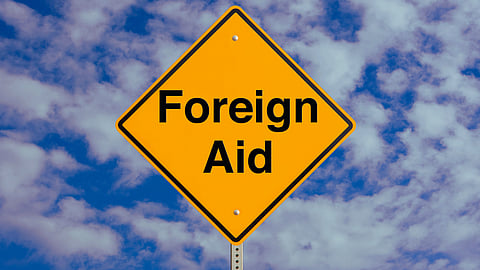Zakhele Mthembu: SA’s problem goes far beyond aid from the rich North
Key topics:
- SA relies on foreign aid due to unsustainable government spending.
- Aid dependency stems from policies that hinder wealth creation.
- Economic reforms are needed to reduce reliance on foreign funding.
Sign up for your early morning brew of the BizNews Insider to keep you up to speed with the content that matters. The newsletter will land in your inbox at 5:30am weekdays. Register here.
Support South Africa's bastion of independent journalism, offering balanced insights on investments, business, and the political economy, by joining BizNews Premium. Register here.
If you prefer WhatsApp for updates, sign up to the BizNews channel here.
By Zakhele Mthembu*
The recent temporary withdrawal of USAID funding by the United States government has shown how reliant African economies are on the largesse of other jurisdictions. Even a small part of the South African health budget came from the United States taxpayer. As people are seeing the pitfalls of aid, we must ask ourselves why we need it in the first place.
Let us set a practical example with our own country. The South African government has no money; it gets its money from us taxpayers. This money is then used to fund every government program, from the salaries of insourced cleaners to the servicing of the fleet of VIP vehicles for the executive.
Should the government's planned expenditure be more than taxes, the government does not try to limit their spending like what many would suggest one does when their spending is more than their income or revenue. No, not the government!
Instead, the state goes out to international finance institutions like the International Monetary Fund or the World Bank to seek the funds for the shortfall through loans. In South Africa, our debt servicing costs are proof of our state having borrowed in the past to fund something.
On top of this avenue for taxing and loans, the state can receive funding for this spending of theirs from other states whose citizens are wealthier than theirs. So, the richer country will just give another country this money, usually with the caveat of a favourable trade deal for the donor country or something akin to that.
This is the case with South Africa's health program which was funded by the United States. The South African state has a program which it could not fund by itself fully without receiving external donor funding. Therefore, the problem is not that the aid came with strings attached about which types of policies the country receiving it could adopt.
Rather, the problem is that the South African state has plans it cannot finance itself. The problem is that South African politicians, voted for by South African citizens, want to do something for which there is no money, and instead of finding money elsewhere internally by cutting spending in something not as pressing as HIV treatment funding, they instead chose to receive money from a foreign jurisdiction.
The idea that a state must perform every activity for its citizens has created fiscal holes in a lot of third-world governments that were only being filled by things like aid. Therefore, the problem is not aid per se, the problem is the attitude African leaders have about the role of the state in society, which informs their policies.
This vulnerability exists because Africa has, since its dawn of independence, been opposed to those policies which generate wealth and prosperity, opting instead for the serfdom-creating developmental economics of state intervention. This situation was identified by the late Ghanaian economist Dr George Ayittey in his various publications, and he was a lifelong advocate for the adoption of prosperity and wealth-creating policies underpinned by freedom for African people.
We must not be misdirected and misled by politicians who will want to seize upon feelings of patriotism which have arisen in South Africa after the back and forth between our leaders. Instead, the focus of citizens should be the position, fiscally, the policies of the government have put us in as a country wherein we have domestic health priorities funded by foreign taxpayers when we are paying taxes too.
If the country is to navigate the economic whirlwinds we face, a change in how the state is viewed is necessary. This is why the Free Market Foundation continues to advocate for sound economic policies which will put us on the track of prosperity.
Policies like cutting the size and/or scope of the state, to minimise the cost to taxpayers, must be considered. This will eliminate the need for loans to finance budget deficits, loans which result in debt financing obligations that eat into other possible expenditure items. Most importantly, this will eliminate the prospect of ever being beholden to aid from any country.
Policies like deregulation of our labour market and allowing for more freedom in contracting must be considered and implemented. The South African economy needs a highly dynamic labour market that has as minimal regulation as possible to enable it to absorb the millions of unemployed. More people being employed translates to less state dependence and more revenue through taxation, further eliminating the prospect of needing aid.
Unless South Africa adopts a domestic policy position that promotes the liberty of individuals and their businesses to trade freely while protecting their rights to property, then it will continue to need aid. Therefore, the problem is not aid; the problem is that our state needs aid because it has created conditions which have put us down the road to serfdom.
Read also:
*Zakhele Mthembu: BA Law LLB (Wits) is Policy Officer at the Free Market Foundation.

